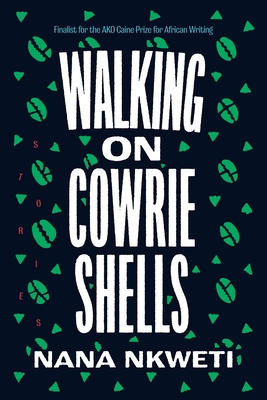Nana Nkweti is the author of the story collection Walking on Cowrie Shells. An AKO Caine Prize finalist and alumna of the Iowa Writers’ Workshop, her work has garnered fellowships from MacDowell, Kimbilio, Ucross, and Clarion West, among others. She has studied international law and trained and practiced as a nurse, and is now a professor of English at the University of Alabama.

-
Walking on Cowrie ShellsStoriesFrom"The Devil is a Liar"
Hours later, Temperance is leading a “Mommyhood: The Christian Way” workshop for unwed mothers. She takes deep breaths, still trying to channel her mother’s certitude that this child was meant to be, ordained. The mothers around her are lollipop young, mainly from the projects, and chockablock with children. She can almost look at them now and not hurt. Before, her ovaries would ache just to be in this room with so many women who seemed to get pregnant if you so much as blew on them. Shanice begat Shanice Jr. begat Lativia begat LaRenée begat Jamelia begat Jameka. Begat, begetting, begotten.
Temperance had shared these thorny thoughts with Andrew once—confession, allegedly good for the soul and all. She had whispered that night, but her grievances somehow echoed in the cloistered silence of their bedroom. Why, Andrew, why? Why would God bless them and not her? Hadn’t she done everything right, everything expected? Waited to get her JD, her MRS. Why was she still waiting on her happily ever after? Andrew knuckled tears from her cheeks, his eyes filled with such tender disappointment, as he reminded her she was better than that, a woman of God—above such pretty, elitist notions. She bowed her head then. She listened as he prayed.
But sometimes, Lord. Sometimes. Walking on Cowrie Shells: Stories
Walking on Cowrie Shells: Stories- Print Books
- Find your local bookstore (via IndieBound)
- Bookshop
-
Walking on Cowrie ShellsStoriesFrom"Kinks"
He kept her in bed for days at a time. Sweating out her blowout. Edges and toes curling again and again. In moments between, she would lie along the stalk of him. Tracing twin scars along the hollow of his side. Battle wounds, he’d answered to questions unspoken. Ear to chest. Hairs tickling her cheek. His voice a grumbling lullaby telling tales of ancestors: of kings, of queens from Africa past. He claimed them by birthright. No genealogy sites traced his DNA across the diaspora. Yet by his estimate, he was descended from Sheba and Sundiata, from Makeda and Menelik. He joked about his credentials—a Morehouse, Princeton, and Harvard alum. Bread-and-buttered on the stoops of Bed-Stuy, where your street cred—the only pedigree that truly mattered—was measured by number of shots survived, by who and how many feared you.
He was cocky. Completely at ease in his skin and his identity. It was seductive as fuck. Head on his chest, Jennifer sometimes bit down on his nipple till she drew blood: craving him, suckling in that knowing ease for herself. She, the child of a timid mother, ever grateful for kitchen scraps. One of two Black girls in Scarsdale elementary class portraits, backdropped against classmates with skin the color of flash paper, burning memories of her away. Her mother had stayed mute on the subject of their culture. What did she know of her heritage? Her brilliant ancestry. No matter how many boardroom doors Jennifer walked through, sometimes she felt her steps falter—in the Ghanaian beauty shop, at Awing tribal meetings, she felt like a counterfeit African, felt the unworthiness of the maid’s child tiptoeing through the servants entrance, lightly, quietly, like she was walking on cowrie shells. Walking on Cowrie Shells: Stories
Walking on Cowrie Shells: Stories- Print Books
- Find your local bookstore (via IndieBound)
- Bookshop
-
Walking on Cowrie ShellsStoriesFrom"Schoolyard Cannibal"
College tests you. There are Swahili 101 electives, classmates in Bantu knots, and kumbaya African Student Union meetings, monthly. Yes! Yet certain lessons are trying. A media studies class schools you on symbolic annihilation—the omission, the mis- or underrepresentation of whole peoples in book leaves, in film reels. And you remember your skin is the color of redaction. You remember confusion as old elementary school “friends” poke you online. Who are they? Their names are never next to yours in class photos, in yearbooks. Were you friends? Where is the evidence, the proof of life? Hives punch through your skin like pissy ellipses. Scratch them raw till a patient school therapist explains that this is how a body purges upset. No matter how long suppressed.
Try and try to forget. Your memory had always been fuzzy, tending toward breaks in the transmission, bald spots of time you had jokingly dubbed “selective amnesia.” But still moments remain. You, itty-bitty—all nappy plaits and teddy bear eyes. A soft one you were. Keen on gold stars. Undone by scolding. When you made mistakes—as children are wont to do—there were inconsolable fits of despair. Your worried mother gifted you a children’s book on self-esteem whose pages held a mirror. She bid you look. Singsonging of all the ways in which you were wonderful. You are smart. You are beautiful. You are worthy. You are kind. Your agile young mind struggled to absorb those images, so at odds with those of books and television, of schoolmates and teachers alike. The mirrored book grasped tight in your trusting hands. Look again, child. Mama told you. Look. But you were gumdrop young: tender-headed and tenderhearted. You turned from your likeness. Walking on Cowrie Shells: Stories
Walking on Cowrie Shells: Stories- Print Books
- Find your local bookstore (via IndieBound)
- Bookshop
“Raucous and thoroughly impressive . . . . Nkweti’s utterly original stories range from laugh-out-loud funny to heartbreaking, and are often both . . . . Sensitivity, nuance and keen attention to history shine through on every page of the collection . . . . These are stories to get lost in again and again.” —Deesha Philyaw, The New York Times Book Review [on Walking On Cowrie Shells]
“It takes some verve to go from zombies and mermaids to Comic-Con to the suburbs of New Jersey and Cameroon and back again in a single collection, and Nkweti does it in her very first, which is vibrant and polyphonic . . . . [Her prose is] acrobatic and delightful.” —Emily Temple, Lit Hub [on Walking On Cowrie Shells]
“Funny and heartbreaking and wonderfully ferocious. It’s been ages since I’ve read sentences with this much verve and snap.” —Carmen Maria Machado, author of In the Dream House [on Walking On Cowrie Shells]
Selected Works

- Print Books
- Find your local bookstore (via IndieBound)
- Bookshop
Nana Nkweti can do anything – realism, satire, avant-garde playfulness, essayistic exploration. What remains consistent is the vibrancy of her voice, which captures a borough’s worth of clamorous experience, and the immediate authority she establishes on the page. Nkweti’s astonishing ability to make visible the ebbs and flows of intimacy enriches her stories with lyrical yearning. There’s also a slyness here, an irrepressible humor that pushes against assumptions about what it means to be African, an immigrant, young, and defiant in a family or a country that expects silence and obedience. She is a writer whose horizons seem limitless.